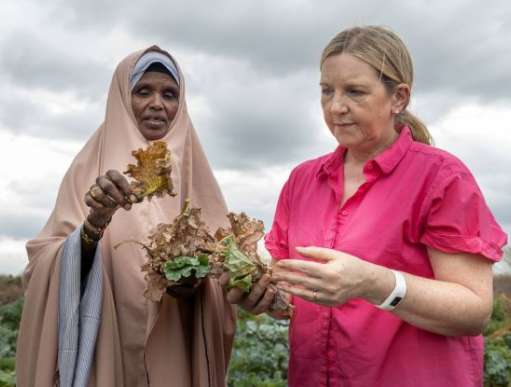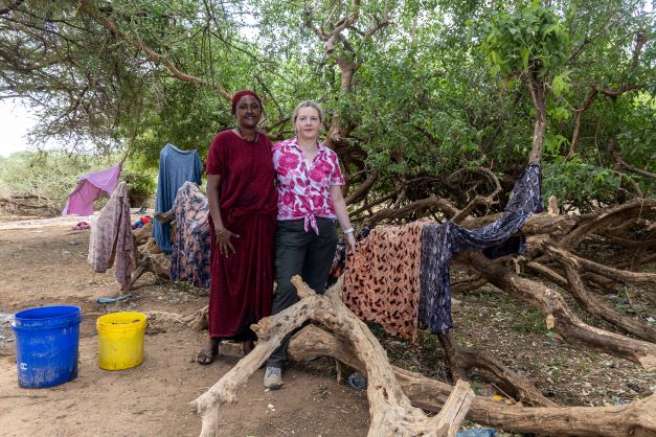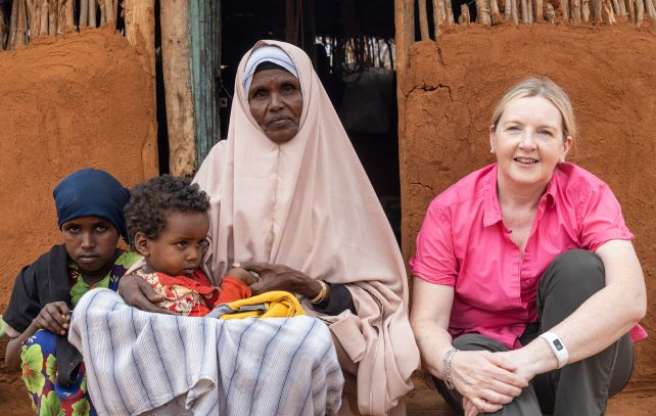Following her trip to Northern Kenya in June, Christian Aid Ireland’s Chief Executive Rosamond Bennett describes the terrible toll drought is having on communities living on the frontline of the climate crisis.
The sun is shining and the sky is blue as we drive north out of Nairobi. We pass by large swathes of crops and for a while the land looks good – fertile and productive. But as we continue on the long journey to Marsabit, the scenery changes, it gets hotter, drier, dustier and the only green is from the acacia trees that thrive in these arid conditions.
Young boys seek shelter under them as they watch over their small livestock herds roaming in search of food and water. As they see us approach they run to the side of the road and make drinking gestures, desperate for water. We give them what we have. We drive over several river bridges on the way but none of them have water. They are just wide, empty tracts of sand and dust and I can only imagine how they must have looked in better days when the river was full and teaming with life.
I am on my way to meet people in Marsabit county who have been supported by Christian Aid and our partner Community Initiative Facilitation and Assistance (CIFA). This area of northern Kenya is experiencing its driest conditions in over 40 years and its fourth consecutive failed rainy season. Right across the Horn of Africa, 20.5 million people are facing food shortages due to drought, with 3.5 million of these in Kenya.
These are people who were already vulnerable to begin with, who rely on the predictability of the rains to grow and sell food and crops to feed their families and their livestock, to have money to set aside for medicine, their children’s education and emergencies. But each season the rains have failed to come and the harvests have either not materialised or been insufficient. Added to this is the lingering economic impact of the pandemic, the locust invasion last summer that decimated whatever crops did grow and now the impact of the Ukraine crisis on the cost of fertiliser and fuel. It all feels too much for them to bear and yet they know there is no alternative.
When Christian Aid and our partner first started working with some of these communities, we helped them set up self-help groups involving mostly women and young people specialising in livestock management (cattle, camels or goats), vegetable production, beekeeping and poultry rearing. Everyone I spoke to said how much these groups and activities have helped and supported them, but the prolonged drought is making life extremely challenging. Their livestock are dying, even the camels. I saw carcasses every few metres where, weakened by hunger and thirst, animals simply dropped and died on the spot. Across the Horn of Africa, nearly 9 million livestock have died in recent months, with 2.4 million having died in Kenya alone.
Fatuma Said Kassim is a 65-year-old farmer and mother of eight who is a member of the Umoja Self Help Group in Qoloba, Marsabit county. She said, ‘the groups were a real eye opener, we soon realised how much more we could do as a group. We have been progressing well but now we are badly affected by the drought. We have no meat or milk to sell. We can’t water our vegetables because there is not enough water. We are losing a lot of animals. No one has cattle anymore.’
Fatuma Said Kassim showing CEO of Christian Aid Ireland Rosamond Bennett shrivelled Kale.
Image credits and information

Barwaqo, a 26-year-old mother of three and fellow member of the group added, ‘we need money and food now. Our children are malnourished. We rely on milk from our animals but we don’t have much milk because of the drought and our children are suffering.’
Everyone is suffering. It is etched on the faces of the mothers who sit quietly and dignified with their young children subdued on their knees. There is no laughter, no chatter among the women, no smiles. Their insecurity and vulnerability are plain to see. I can’t help but wonder how much worse it is in those communities where we have not been able to provide any support.
Before the drought, people ate ugali, a mix of vegetables, fruit, meat and had milk from their camels, goats or cattle. Now Barwaqo tells me the best she can do is make a stew from kale with perhaps some onions and tomatoes. I go with her to see the group’s vegetable plantation, only a small area of it now has vegetables because there isn’t enough water to go around. Some of the kale looks ok, but a lot is shrivelling and dying and the maize, watermelon and onions don’t look too healthy either. It’s because they can no longer afford the fuel to pump water to the plants – even here the Ukraine conflict is causing financial difficulties.
Yusuf Mohammad, a leader of the youth group in El-Raya, looks like he has the worries of the world upon his shoulders. He is proud of what the groups in his community have done. They’ve excavated large waterpans for rain collection and they’ve harvested hay but there has been no rain to fill the waterpans and the grass seed they purchased from their last hay harvest did not grow at all. When I asked him what is the one thing that would help him right now, he looks at me before dropping his head and says food. ‘We are all getting more and more vulnerable. We go to bed hungry every night,’ he says.
It is getting late in the afternoon when we get word that some animals were stolen the night before and as a result there are more army checkpoints than normal. We need to get a move on to make it through them and to meet the 6pm curfew, imposed throughout the county in a bid to minimise conflict as people become desperate to find ways to survive the drought.
On our journey back to Nairobi, we are more prepared and have extra bottles of water to give to the parched young herders as we drive along. We stop at one of the dry riverbeds so I can do a video and it is there that I meet Marian, who is washing her clothes using water that is being pumped up from below the riverbed.
Image credits and information

She tells me that she comes here twice a week to wash her families’ clothes and to buy water to bring home, which she pulls behind her in a makeshift barrel. She walks 20km each way in her flip flops and has to wait until her laundry is dry so that it is lighter to carry back. She doesn’t have enough money to get a bus or motorbike taxi, only enough to get water. Today her 11-year-old daughter has walked with her. I am humbled by Marian’s determination to keep walking 40kms each time she needs water for her family. As the drought has persisted, she has been forced to walk further and further from her home to get water. By the time we leave Marian, we are surrounded by several young boys who have appeared from nowhere. They make hand gestures close to their mouths, indicating they need food. We each dig into our bags and give them biscuits and other snacks.
The world needs to act now to stop widescale famine from happening in the Horn of Africa. This situation is not unique to northern Kenya, it is happening in Ethiopia and Somalia too and millions of lives are at risk, especially those of children and mothers. We cannot sit back and wait until a famine is declared and then act. We need money and action now to stop people dying, rather than waiting to see if they will die, because believe me they have and they will.
The long-term weather predictions show that the next rainy season later in the year is also forecast to be at risk of failing, so the situation will only get worse. I have seen how close to the edge some of these people already are. I know there are many crises in the world, but people dying from hunger should not be one of them. This is a crisis brought on by how we all live our lives. We have contributed to climate change, we have played a role in changing the environment and causing rains to fail. The people who are hungry, who have done the least to contribute to climate change are those who are suffering the most. They will die because of it, many have already died because of it.
I feel frustrated, angry and ashamed after meeting these people in Marsabit. I feel a responsibility to tell their story, to create a stir, to get action to be taken now before this crisis becomes a catastrophe.
Image credits and information

With your donation, we can help stop this widespread malnutrition and hunger, and help people build a life free from poverty and injustice.



